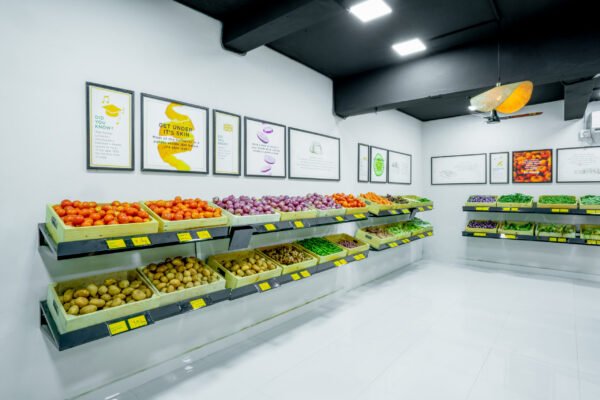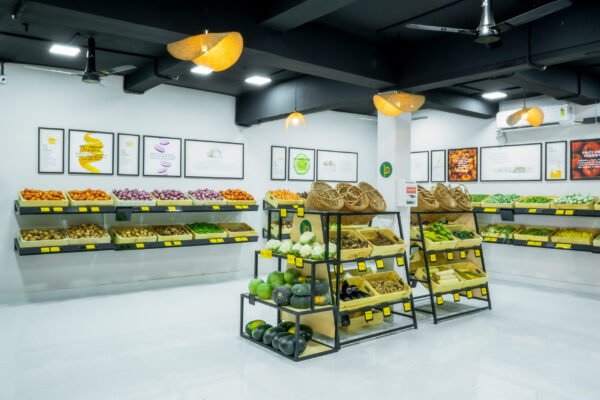Prashanth Vasan, chief executive officer at Madras Mandi on how the farm-to-table omnichannel retailer uses technology to achieve efficiencies that surpass industry standards and benefit over 2000 farmers
New Delhi: Madras Mandi was established in 2020 with the goal of connecting farmers in India with customers. The company guarantees doorstep delivery of over 250 varieties of fresh produce within 12 hours of harvesting. Its unique selling proposition lies in direct sourcing from farmers, leveraging technology for a seamless experience, and fostering a community around the farm-to-table concept.
The company has six stores in Anna Nagar, Choolaimedu, Perungalathur, Nanganallur, Neelankarai and Kolathur with 6 more stores in the pipeline. It is available through a mobile application, with 50% of its sales coming from online.
Madras Mandi’s CEO Prashanth Vasan sheds some light on the business model, daily operations, and expansion plans of the company in an exclusive interaction with IndiaRetailng.
Edited Excerpts with Madras Mandi CEO…
How did the brand start its journey?
Our inception dates back to the ’70s when our parent company Annamalai Agro Products Pvt. Ltd. embarked on a journey to revolutionise the fresh produce landscape. Over 50 years of expertise and a tech-driven approach have helped us make Madras Mandi a reliable bridge linking farmers and customers. We are dedicated to delivering fresh produce to our customers while simultaneously bolstering the vibrant agricultural landscape in South India.

Can you elaborate on what the company does?
Our strength lies in managing the entire supply chain, disrupting unorganised systems that burden farmers. We ensure quick transactions, transparent and fair pricing, and competitive opportunities for farmers reducing dependency on middlemen. By purchasing the entire harvest from partner farmers, we provide a reliable market to farmers and ensure they receive a good and profitable wage for their harvest. This puts an end to oversupply by farmers for insurance, food wastage due to improper storage, and rotting due to a lack of timely buyers.
We proudly affirm that our system has brought tangible benefits to over 2,000 farmers.
What is Madras Mandi’s revenue model?
We primarily generate revenue through point-of-sale transactions on our app and in physical stores. Key activities involve continuous app development, maintaining relationships with local farmers, and stringent quality control.
Who are your target customers?
Our customer segments include urban consumers, health-conscious individuals, quality-focused consumers, and those seeking a variety of items.
We build and sustain customer relationships through responsive support, personalised recommendations, and community engagement via social media and partnerships.
How do you empower farmers using technology?
We have established a direct and transparent connection between farmers and consumers by leveraging technology. Additionally, technology facilitates real-time information on market trends, demand fluctuations, and pricing dynamics. The use of data analytics further enhances the system, contributing to increased efficiency and sustainability for farmers as well as Madras Mandi.
How do you contain wastage?
In addition to addressing operational inconsistencies, our solution prioritizes sustainability through eco-friendly packaging in deliveries and in-store sales, reducing reliance on traditional materials and contributing to carbon footprint reduction.
Furthermore, thanks to our tech-enabled supply chain management system our wastage is less than 5%, surpassing the industry standard of over 35%.
Through precise supply chain control, our products have successfully eliminated substantial revenue loss associated with procurement inefficiencies, and delivery challenges.
How do you ensure minimal returns?
Our current return percentage stands at less than 1%. This is because we follow the ‘no gimmicks approach’ by avoiding the lure of a 5-minute delivery. We encourage customers to make more considered and deliberate purchasing decisions by carefully evaluating their choices which reduces the likelihood of returns based on impulse purchases.
Our produce undergoes a three-step grading process to maintain the highest quality standards: at the farm, at the warehouse, and just before delivery.
A good customer support and feedback loop allows us to refine our processes to meet and exceed customer expectations continually. Finally, by optimizing logistics and operations, we not only enhance sustainability but also reduce the chances of returns related to issues in the supply chain.

How do you manage 12-hour delivery from harvesting?
The journey from harvest to doorstep within 12 hours is no small feat. Here are the pivotal steps that help us achieve it:
Single Structure: By consolidating all supply chain functions within a single organization, we have overcome the complexities inherent in the expansive system, fostering a more agile and responsive process.
Direct Farmer Engagement: Cutting through layers of intermediaries, we establish a direct connection with farmers. Our technology-driven forecasting accurately determines the type and quantity of products required, enhancing efficiency and transparency.
Dawn Operations: Early-morning operations ensure that the harvest is promptly gathered and transported to our stores and warehouses, preserving the vitality of the produce.
Delivery Precision: We prioritize efficiency to guarantee that the harvest reaches our customers on the very day it is picked.
Share some insights on the average delivery radius.
Currently, our average delivery radius for instant delivery is within 5 kilometres, and our next-day delivery extends to the entire Chennai. This tiered approach allows us to cater to immediate local needs while also providing broader accessibility.
In the future, we envision expanding our instant delivery and next-day delivery radius to cover more neighbourhoods and expanding our reach with six more stores.
How was 2023 in terms of revenue and sales?
In 2023, our financial performance has been marked by consistent growth, with a 20% month-on-month increase in revenue and sales. This sustained upward trajectory represents a 40% growth compared to the previous year.
Do you plan to go national?
As of now, our strategic focus is on Chennai, and we do not have immediate plans to expand Madras Mandi’s business model to other parts of the country.
What are the expectations from 2024?
In 2024, alongside our expansion plans, Madras Mandi has a clear focus. As is our norm, we aim to maintain competitive and stable prices no matter the market change.
Our dedication extends to upholding the highest quality standards, particularly during peak demand periods.
Additionally, we plan to broaden our initiatives with our farmers, positively impacting their livelihoods and supporting prosperity within the agricultural community.
How Madras Mandi uses tech in its supply chain
- Demand forecasting: The platform can consistently predict the quantity of fresh fruits and vegetables produced by farmers and match it with customer requirements.
- Procurement and inventory management: No extra time, money, effort, or manpower is wasted on the supply chain. The company has developed a stable and methodical approach to procurement from multiple sources with conveniently located collection centres. This also enables it to regulate prices.
- Logistical efficiency: The company achieves this by using an in-house system called ‘fresh tech’.
More insightful and stimulating conversations on technology trends in retail are expected at the Phygital Retail Convention (PRC) 2024.



